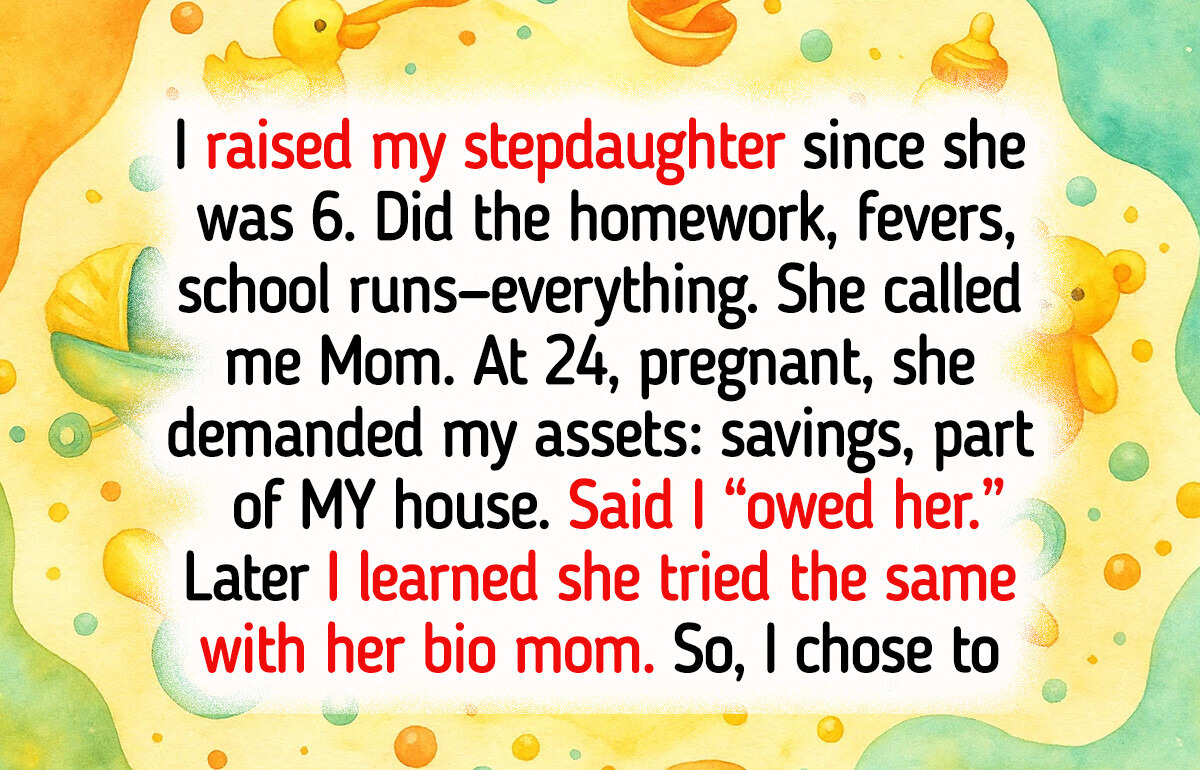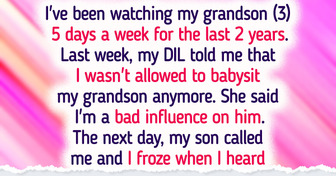Even if it was your actual daughter I would say hell no. Why are people so entitled. Be careful if your husband doesn't step up and say no he could be in this with his daughter. Don't give them a penny.
I Raised My Stepdaughter Like My Own—Now She Treats Me Like an ATM

When love turns into entitlement, even family ties can start to feel like chains. One of our readers shared her story about raising a stepdaughter as her own — only to be told years later that love should come with a price tag.
The letter:
Hi Bright Side!
I married my husband when his daughter was 6. Her mom was out of the picture, and I stepped up — homework, late-night fevers, school pickups, everything. Over the years, she began to call me “Mom,” and I truly felt she was mine. I never thought of her as anything less than my own child.
Fast-forward: she’s 24 now, in a shaky relationship, and she gets pregnant. Instead of coming to me for comfort, she sat me down and demanded that I transfer part of my assets to her — my savings and even a share of the house I’d bought before marrying her father.
She said, “You raised me, so you owe me. Real mothers secure their grandchildren’s future.”
I was stunned. My husband stayed quiet, almost as if he agreed. That silence cut deeper than anything.
A month later, I learned from a friend that she had also approached her biological mother — the woman who had abandoned her — with the same demand. Except this time, she promised to “rebuild their bond” if money was involved.
That was my breaking point. I realized it wasn’t about love, family, or trust. It was about what she could get from me. I told her calmly: “I chose to love you, but love is not a contract. I gave you my heart, not my bank account.”

The Psychology Behind Love and Leverage
Relational Entitlement: When Love Becomes Leverage
Research shows that people with relational entitlement often expect special treatment from loved ones without offering reciprocity. They see affection as a currency. Over time, this mindset leads to conflict and resentment.
In this case, the stepdaughter’s belief that she was “owed” assets wasn’t about gratitude — it was about seeing love as a transaction.
Emotional Manipulation and “Financial Gaslighting”
Emotional manipulators often twist acts of love into obligations. They guilt others into compliance, saying things like, “If you cared, you’d do this for me.” Psychologists call this financial gaslighting — when someone undermines your right to manage your own money or boundaries.
👉 Definition of financial gaslighting
Her demand wasn’t about security; it was a power move — testing how far guilt could stretch love.
Why Silence Hurts More Than Words
According to relationship studies, silence in conflict can trigger the same pain centers as rejection. The partner’s failure to defend her wasn’t neutral — it was perceived as withdrawal of alliance.
👉 Emotional impact of silence in relationships
That quiet moment from her husband said what words couldn’t: you’re on your own.
Tips

Label your feelings & reflect first
Pause and name what you’re feeling (hurt, frustration, betrayal). Emotional labeling reduces the intensity of negative emotions. This helps you respond rather than react.
Support: Neuroscience shows that identifying emotions engages the prefrontal cortex, which helps regulate emotional responses.
Use “I” statements & frame requests, not demands
For example: “I feel unsupported when financial demands are made. I need clarity on what’s fair.” This reduces defensiveness in the other person.
Support: Psychology Today’s guide on boundary setting emphasizes that how we communicate boundaries is just as important as having them.
Set micro-boundaries first
Before tackling big demands, start with small boundaries: no late-night calls, turning off notifications after a certain hour, “meeting-free” blocks in your calendar. This builds confidence for bigger boundaries.
Support: UC Davis experts highlight that setting boundaries gradually helps you feel more secure and resilient as you enforce them.
Be consistent & repeat when needed
If someone crosses your boundary, calmly restate it. Consistency builds credibility and eventually shapes expectations.
Support: Healthy boundaries reduce stress and increase relationship satisfaction.
Protect your emotional reserves
Recognize when you’re emotionally depleted and take breaks, rest, or seek support. Burnout can make boundary enforcement harder.
Support: Stronger boundaries help reduce burnout, emotional exhaustion, and mental distance in professional settings — the same logic applies in personal relationships.
Understand entitlement dynamics
People with relational entitlement often expect their demands to be met without negotiation. Recognizing this pattern helps depersonalize the conflict.
Support: Research on relational entitlement links “inflated expectations” with lower relationship satisfaction and heightened conflict.
Practice boundary rehearsal
Mentally rehearse setting the boundary and anticipate pushbacks. That builds confidence when the moment arrives.
Support: Boundary models in therapy and clinical practice emphasize that rehearsing responses helps when high emotional stakes occur.
In the end, love should never come with a price tag. You can give your heart, your time, and your care — but no one has the right to turn that into a debt. Sometimes, saying “no” isn’t rejection; it’s self-respect. Because real love isn’t measured in money — it’s measured in gratitude.
20 People Who Proved That the Kindest Hearts Wear the Strongest Armor
Comments
So your husband says nothing about this outrageous demand - property you owned before him and money's of yours that you added to since. She's already tried unsuccessfully ( by the sounds of it)to emotionally blackmail her bio mom. I'd definitely put a lock down on your personal deeds, bank accounts and properties because this young woman sounds like she has lost at least a few of her morals and the fact her father doesn't correct her in her attitude would scare me more than her initial demand. Is he afraid of losing a daughter/grandchild or is he complicit in this demand somehow and when it comes right down to it, why is she demanding such things from you rather than her father in the first place? Good luck to you, hoping you won't need it but. . . .
Related Reads
I Refused to Take My DIL on a Family Trip, She Made Me Regret This

12 Times Kindness Quietly Lit Up the Entire World

HR Fired Me Right Before My Vacation, So I Used It Against Them

My Sister Tried to Turn Our Family Cabin Into Her Free Resort, So I Changed the Rules

20+ Gifts That Prove It’s the Thought That Truly Counts

I Refuse to Forgive My Parents After They Took My Inheritance for Being Childless

My DIL Refuses to Let Me Babysit My Grandson, She Wasn’t Ready for My Payback

15 Times Someone Showed Kindness Without Saying Anything

11 People Who Chose Humanity Over Hatred in the Darkest Moments

14 Quite Acts of Kindness That Changed Someone’s Life Forever

I Refuse to Let My Sister Hijack My Pregnancy Announcement

My Boyfriend’s Mom Kept Mocking My Career—My Response Silenced the Whole Table
